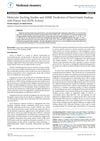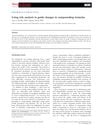 4 citations,
January 2019 in “International journal of bioorganic chemistry”
4 citations,
January 2019 in “International journal of bioorganic chemistry” Using medicinal plants traditionally helps in their preservation in Charmang Village, Pakistan.
 15 citations,
January 2014 in “Medicinal chemistry”
15 citations,
January 2014 in “Medicinal chemistry” Some new isatin compounds could be strong cancer-fighting drugs because they fit well in cancer-related proteins and have good drug-like properties.
 8 citations,
January 2013 in “Medicinal chemistry”
8 citations,
January 2013 in “Medicinal chemistry” The compound 4c showed strong potential as an anticancer agent.
 October 2022 in “International Journal For Multidisciplinary Research”
October 2022 in “International Journal For Multidisciplinary Research” Hibiscus flowers have many medicinal benefits and are generally safe.
Medicinal plants are important for local health in La Tranca Arriba.
 12 citations,
March 2017 in “Medicinal Chemistry Research”
12 citations,
March 2017 in “Medicinal Chemistry Research” Some curcumin-like compounds can effectively and safely block the enzyme linked to hair loss and other conditions related to male hormones.
 2 citations,
July 2020 in “PubMed”
2 citations,
July 2020 in “PubMed” Herbs and fungi can potentially treat hair loss effectively with fewer side effects.
 May 2024 in “International journal of nanomedicine”
May 2024 in “International journal of nanomedicine” Plant-derived extracellular vesicles show promise for treating diseases like cancer and inflammation.
 January 2023 in “International Journal of Molecular Sciences”
January 2023 in “International Journal of Molecular Sciences” Maxillariinae orchids contain 62 compounds with potential health benefits, including treating skin conditions and diseases like cancer and diabetes.
 January 2019 in “International Journal of Pharmacognosy and Clinical Research”
January 2019 in “International Journal of Pharmacognosy and Clinical Research” Mexican medicinal plants are used to treat hair loss.
 1 citations,
August 2023 in “Frontiers in immunology”
1 citations,
August 2023 in “Frontiers in immunology” Traditional Chinese medicinal foods may help manage long-term post-COVID symptoms.
October 2019 in “International Journal of AYUSH Case Reports” Leech therapy and medication helped regrow hair in a man with patchy hair loss.
 January 2023 in “Eurasian journal of science and engineering”
January 2023 in “Eurasian journal of science and engineering” Medicinal plants in Kurdistan have potential health benefits and need more research for drug development.
 November 2023 in “Turkish journal of botany”
November 2023 in “Turkish journal of botany” Türkiye uses many local plants to treat skin problems.
 May 2021 in “Austin journal of pharmacology and therapeutics”
May 2021 in “Austin journal of pharmacology and therapeutics” Physalis fruits have medicinal properties that can help treat various diseases and have anti-inflammatory, antioxidant, antibacterial, and antitumor effects.
2 citations,
April 2020 in “International journal of research in pharmaceutical sciences” Using Malaysian medicinal plants in cosmetics can treat skin and hair issues with fewer side effects than synthetic products.

Avicennia marina extract may help treat hair loss naturally.
 3 citations,
July 2021 in “International journal of pharmaceutical chemistry and analysis”
3 citations,
July 2021 in “International journal of pharmaceutical chemistry and analysis” Medicinal plants like Aloe, Amla, and Coconut oil help with hair and skin care.
 3 citations,
March 2016 in “Medicinal Chemistry Research”
3 citations,
March 2016 in “Medicinal Chemistry Research” Scientists found out the structure of a human enzyme linked to prostate cancer and hair loss, which could help in designing drugs.
 4 citations,
September 2015 in “Bulletin of the Korean Chemical Society”
4 citations,
September 2015 in “Bulletin of the Korean Chemical Society” Researchers developed a quick and sensitive method to identify and measure hair growth-promoting substances in a herbal mix.
 February 2023 in “Aesthetic Cosmetology and Medicine”
February 2023 in “Aesthetic Cosmetology and Medicine” Medicinal plants in nutricosmetics contain compounds that can improve skin and hair health.
 25 citations,
March 2018 in “Clinics in Dermatology”
25 citations,
March 2018 in “Clinics in Dermatology” Indigenous herbal medicines in the Indian subcontinent have potential for drug development but need more research and standardization.
 November 2023 in “Research journal of pharmacy and technology”
November 2023 in “Research journal of pharmacy and technology” Medicinal plants may effectively treat hair loss.
 1 citations,
March 2018 in “Dermatologie pro praxi”
1 citations,
March 2018 in “Dermatologie pro praxi” Most over-the-counter hair loss treatments lack strong evidence of effectiveness, except for minoxidil, which works but stops working if you stop using it.
 1 citations,
December 2019 in “Formuly farmacii”
1 citations,
December 2019 in “Formuly farmacii” Many people suffer from hair loss, which is caused by a disruption in hair growth, and there is a need for personalized treatments and new drugs.
January 2018 in “대한본초학회지(본초분과학회지)” The herbal extract SHJ promotes hair growth and increases melanin production.
 August 2017 in “Journal of Pharmacy Practice and Research”
August 2017 in “Journal of Pharmacy Practice and Research” Risk analysis is important for safely adjusting pharmaceutical formulas while maintaining their quality and effectiveness.
 47 citations,
December 2006 in “Therapy”
47 citations,
December 2006 in “Therapy” The dietary supplement helped increase hair growth in women with hair loss.
 July 2024 in “Science and Culture”
July 2024 in “Science and Culture” Thuja orientalis L. has many health benefits and could be used in new medicines.
 20 citations,
February 2009 in “Chemistry & Biodiversity”
20 citations,
February 2009 in “Chemistry & Biodiversity” Ganoderma lucidum may help treat prostate cancer by blocking male hormones and slowing cancer cell growth.


























